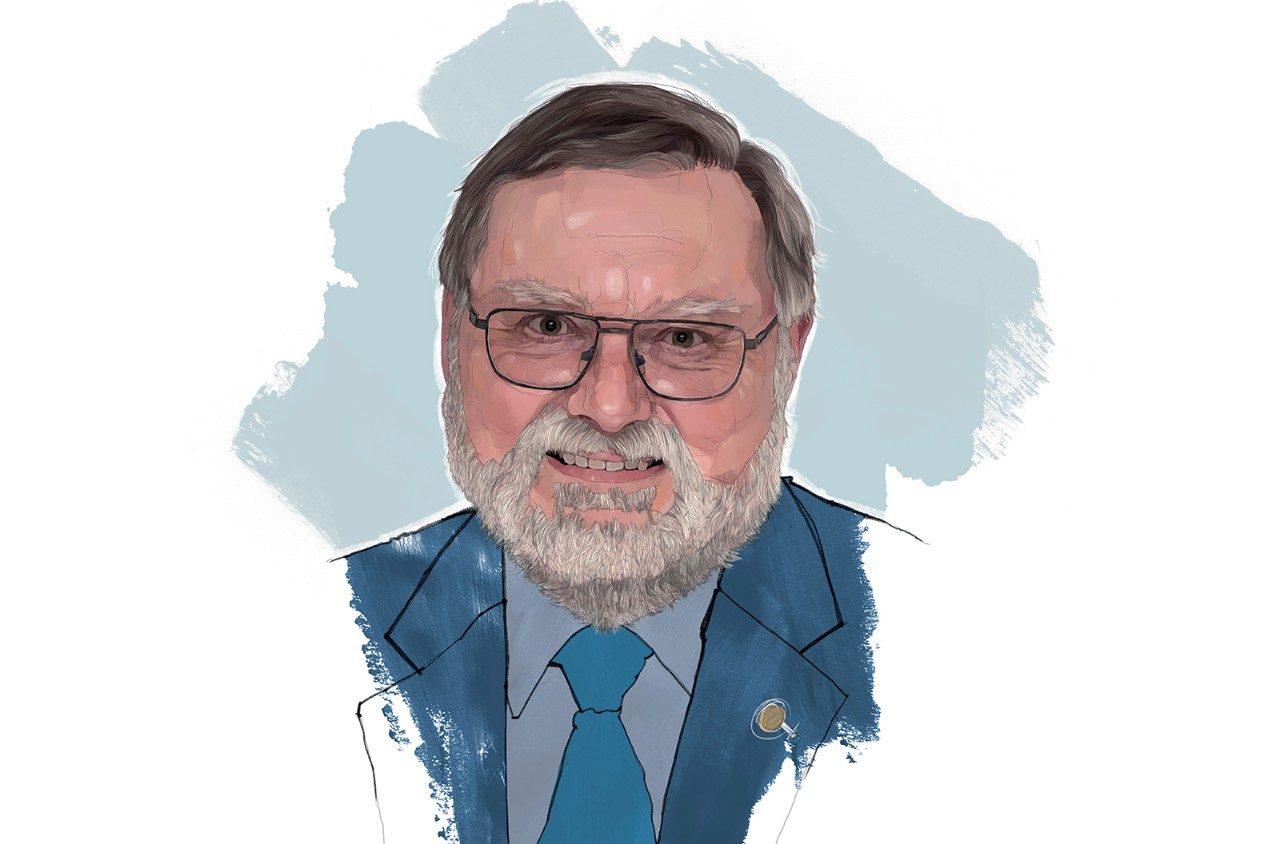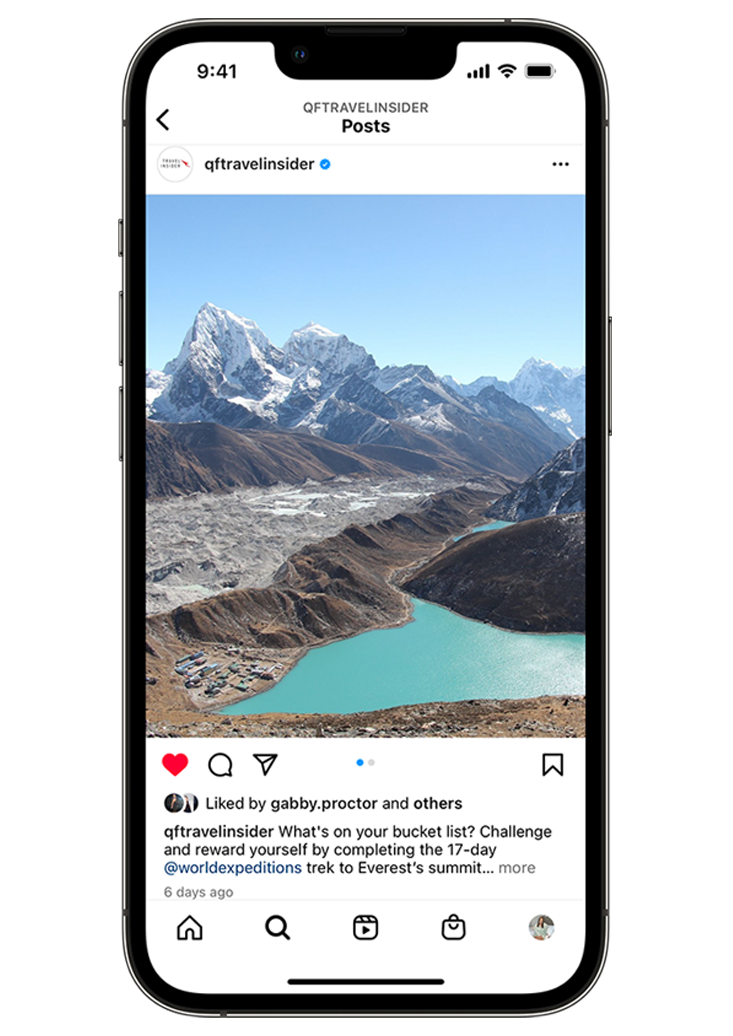Australia’s Chief Scientist Tony Haymet on the Importance of Sticking to the Facts

Australia’s newly minted chief scientist, Tony Haymet, is a professor of oceanography who suggests we should all stick to the facts.
Current role: Australia’s chief scientist
Tenure: Three months
Previous roles: Emeritus director and vice-chancellor, Scripps Institution of Oceanography; chair, Antarctic Science Foundation; chief of marine and atmospheric research, CSIRO
How do you define great leadership?
It’s about accomplishing goals in the most efficient way possible. And the kindest way possible. There are lots of ruthless leaders in the world who might get to the end goal but I think there’s a great need in the workplace – and in society – for doing things in a nice way. Gifted leaders are clear and focused; they empower their staff and collaborators but also get to the end goal with everyone feeling pretty happy about it.
You were appointed by the prime minister for a three-year term to help the government make better decisions on science and technology. What’s the number-one thing you want to achieve in that timeframe?
I want to help Australia become more self-sufficient and use our great scientists, engineers, mathematicians and social scientists to make our way in the world and feel confident that we can do things ourselves. We can have partners and collaborators when we want to and when it’s necessary but we should also have faith that we can do it here in Australia.
What do you think is holding us back?
I don’t know. We’ve let go of some of the industries that we used to be great at – making cars and automobiles, for example. It was easier to go along with having someone else do it for us. Maybe it’s a cliche of an Australian trait but in many cases, we took the easy way out. And I don’t think we fully understood the risks that we were exposing future Australians to when we did that. I’m so impressed with the young people I meet who are entering science and technology. They’re exactly the kind of independent, big thinking, fearless people that we need. So I think we have a bright future. But we have to go back to good old Aussie know-how and get it done.
What’s the biggest opportunity for Australian scientists?
There’s a whole raft of new technologies in which we excel, including fields that everyone always talks about, like quantum, astronomy, medical instrumentation. All those things are true – and there are great opportunities for Australian leadership in quantum technology – but there’s also a fantastic record of innovation in agriculture in Australia. The world needs food; it needs more protein. Australian farmers and agricultural scientists have a track record of being incredibly inventive and there’s a great opportunity for us to do more.
As you discovered on day one when you were asked to respond to the Opposition leader’s critique of the CSIRO GenCost report, this job can be overtly political. What’s your strategy to stay out of trouble?
Well, we try and stick to the facts and use data. We don’t indulge in the exchange of mere opinions. So when we get questions like that, we try to respond on a factual level. How much electricity are we generating, how much pollution are we making, how much water do we need to consume? It’s easy to get distracted from that but it’s part of my job to provide reliable, well-sourced scientific information that can be defended and examined and exposed to the rigours of the scientific process – and be reported in a sober and neutral way.
What do you do when evidence-based information isn’t enough? How do you counter skepticism and resistance?
Our National Science and Technology Council has been working on a report on misinformation and disinformation. It’s not quite finished but it’s a wonderful look into how we’re responding to being bombarded with misinformation all the time. Kids have grown up in this environment, sad to say, and the research in this report says that comparatively, they’re relatively resilient to being misled. The report finds cohorts of people my age and older might have more time on their hands and go down rabbit holes on the web to follow theories that are not well supported by fact. There are people who have very strong opinions and nothing one can say will change their minds.
As chief scientist, you’re focusing on centerpieces of the government agenda, including AI and renewable energy. Is it fair to say you’re wildly excited about AI?
It’s a great opportunity and a great threat. The opportunities for Australia are in what I would call back-office AI. There are wonderful things happening in AI and design – designing the next pharmaceuticals, new financial systems and new ways of tackling complex problems in science and business. AI is a way of using the sum total of human knowledge in a different and more efficient way and it could be great for Australia. But AI consumes a lot of electricity and a lot of customers who we think will want to use Australian AI products will want them to be generated from renewable energy. Thankfully, Australia is blessed with any number of different sources of renewable energy and that’s going to matter in the global marketplace.
Do you see very big data centres being hosted here?
I think the challenge is for us to not just store data here but to do the value-add in Australia. We don’t want to just grow wool and ship it to Italy to be made into beautiful clothes. We can make electrons cleanly, use them to do the AI calculations and then what we export is just through the internet – photons, if you will, down the internet fibres. That’s much more efficient than making electricity and exporting the electricity.
Way back in 2007 you said there was an economic case that Australia should invest more in solar energy. How are we stacking up 18 years later?
I think we’ve done awfully well. We’re the leading solar country in the world – and we should be because we’ve got this fantastic resource, which is only matched by southern California and northern Mexico. You can’t ask for more. I was just asked by colleagues in Queensland which of our sources of energy – wind or solar – we should exploit. And I said, “Well, if you were in Finland, you would give your left arm to have any of those choices, wind or solar or any other kind of energy.” We in Australia have pretty much a free choice about what we do.
What other renewables have potential?
There’s very rapid progress right now in the United States and France on fusion energy. And a little-known fact is that Australia has one of the largest wave energy resources in the world. All the way from Albany in Western Australia to Melbourne is basically 24/7 gigantic waves and as yet, no-one’s been able to build a machine to convert that energy to electricity at a price comparable to solar energy. But there are lots of inventors in Australia trying.
The possibilities are so exciting, aren’t they? Are you optimistic about the world?
Oh, absolutely, I’m an incurable optimist. But with the current geopolitical situation, I’m probably at my lowest point. I still annoy people with my optimism but all the conflicts going on in the world affect people. One can be optimistic and hope that we as the peoples of the world find a way to solve those problems and live in harmony, and use the talents that we have to make life better and more pleasant and more productive for everybody.
On talent, what about diversity in STEM? Is there still a long way to go in terms of attracting women?
Finally, we’re off to a great start. There are programs like Elevate, which is run by one of the academies here in Canberra, that has supported more than 400 women in the last few years. There’s still a huge way to go but the tide has turned. In my adopted field of oceanography, in my lifetime, women weren’t allowed on ships. We had alcohol but no women and then at a wonderful point, that flipped – alcohol was banned and women scientists were allowed on the ship. In many university undergraduate programs, we now have more women than men – maybe not in the most hardcore mathematical disciplines but certainly in biology, chemistry and other fields. We certainly see in the PhD ranks a slight preponderance of women. It’s unrecognisable from the community I joined and the benefits are there for all to see.
You’ve been described as the Yuri Gagarin of the ocean. What excites you most about marine science?
Oh, look, the oceans are 71 per cent of the surface of the planet. The old saying goes that we know more about the backside of the moon than we know about the bottom of the ocean – and it’s still true. Every time we go more than 100 metres offshore or dive deeper than 50 or 60 metres, we discover new species. Part of the human condition is to discover the richness of life here on planet earth. We’re just scratching the surface of the ocean. Unfortunately, we’re coming to the limit of what the ocean can absorb for us so it means that we really have to take timely action to stop emitting CO2 and methane. Unfortunately, as Susan Solomon, a scientist at MIT [the Massachusetts Institute of Technology], has pointed out, it’s thousands of years before we can get back to the original state of things. On a human time scale, that basically means we’re making irreversible changes to our planet. That is not a reason to give up and throw our hands up in despair but it’s a reason for stopping emitting right now.
What’s your absolute strength as a leader?
I think I’m direct and open. I’ve had a great track record with deputies who’ve gone on to lead their own organisations. I’ve learnt to trust them quickly and let them get on with their jobs, show initiative and develop their own leadership skills. People gravitate to leaders who give them opportunities.
And what about your biggest gap as a leader?
I’ve always had a problem that years ago would have been called impatience. You know, part of leadership is sitting in briefings and letting people explain their point of view. Sometimes the process can be as important as the outcome. I think my strength is the outcome and whatever weaknesses I have lie in the process department. Obviously, that’s something I’ve been mentored on and tried to learn over the years but you know, I do want to get on with the job. I feel that our planet is in great peril. I think our oceans have been abused and I don’t think we have 10 years to sit around and figure out a clever economic solution to climate change. We actually have to take some action.
Well, you’re in the right place to do that, aren’t you?
Well, I hope so. I’ll certainly try.
What one piece of advice would you give someone who is a brand-new CEO?
Trust your own abilities that have got you to that position. If someone gets to be a CEO and then they read a book that tells them how to be a CEO, that’s probably a recipe for disaster. On the other hand, you can always learn a lot. I learn things every day just by listening to other leaders on how they handle problems and watching how they respond to adversity and setbacks. It really is a constant fleet of knowledge.
On the fly
Personal motto
Actions speak louder than words.
Email approach
It’s a tool, only a tool – one of many.
Motivation tactic
Finish it! Don’t let the perfect be the enemy of the good. When we have a good enough version, that’s great. If there’s time to come back later and polish it, make it even better, that’s great, too. I find in the world we live in, we rarely have that opportunity.
Productivity hack
One touch, except when it’s a really important matter. We get trapped in emails, for example, where you read an email then don’t take action – you don’t dispose of it or you don’t file it away. There are many things that you just have to get on with so I try to do this myself and to encourage my staff to just look at everything once, if possible.
Business book or podcast
The Alchemy of Growth by Mehrdad Baghai, Stephen Coley and David White explains a lot about growth, which is quite controversial in these days of sustainability. It really gets into the issue of how you talk about growth in a modern company or organisation and addresses the conundrum of the fact that eventually we won’t be able to continue growing.
Favourite piece of advice
From my old maths teacher, John Duffy: You make your own luck.



